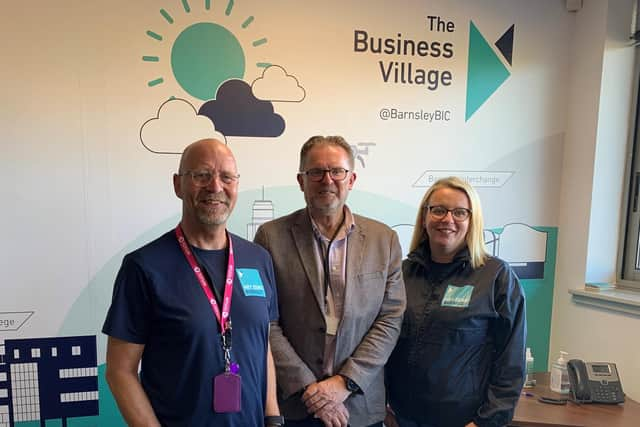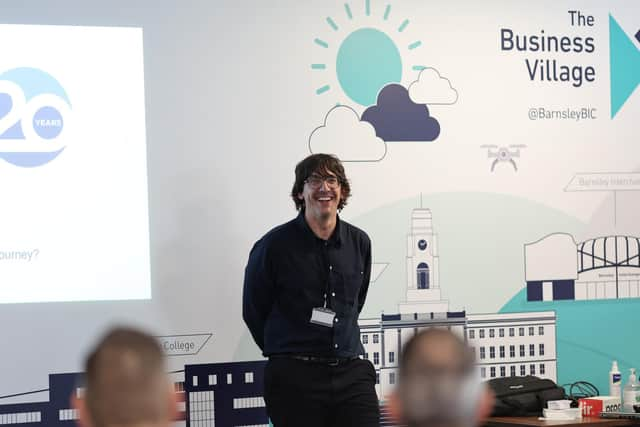Barnsley businesses come together for scheme to support Net Zero commitment
The Net Zero Barnsley accelerator run by The Business Village brought together a community of 38 companies and commercial enterprises to map out environmentally friendly action plans.
The seven-month programme, which ended last month, was set up to help businesses across the borough work towards the UK’s legally binding target to achieve net zero by 2050, and Barnsley’s own commitment to achieve this by 2045.
Advertisement
Hide AdAdvertisement
Hide AdNet zero means any emissions would be balanced by schemes to offset an equivalent amount of greenhouse gases from the atmosphere, such as planting trees or using technology like carbon capture.


Nick Roffey, the commercial manager of Brebur Ltd, a specialist steel frame, dry-lining, plastering and suspended ceiling company, has been a participant in the accelerator. The firm has begun investing in a new electric vehicle fleet to reach construction projects at hospitals and public buildings across the North.
Nick says: “The government has set a target for us all to achieve net zero, but it will be down to individual businesses to do the work. Tackling this is inevitable, so it makes sense to get started and help each other to speed up progress.”
The Net Zero Barnsley programme incorporated sustainability coaching for businesses, peer-to-peer support opportunities and group workshops. Participants received 760 hours of coaching in total and all have taken their first steps to net zero, working through carbon calculators to define and measure existing CO2 outputs and starting on innovation plans to reduce emissions.
Advertisement
Hide AdAdvertisement
Hide AdSixteen of the companies have also drawn up detailed decarbonisation plans which The Business Village claims could reduce carbon emissions by an estimated 41,560 tonnes by 2025. Thirteen in-depth energy audits have also been conducted and these have led to carbon-cutting proposals which it says could collectively reduce annual CO2 emissions by 905 tonnes and energy bills by £726,000 a year.


Actions to reduce carbon include switching to more sustainable forms of energy, investing in new equipment, adopting smart technology, making behavioural changes in the workplace, reducing waste and supporting sustainable transport schemes for staff.
White’s Bakery, for example, has reduced emissions by ensuring optimum use of oven capacity for every bake and removing carbon-emitting ‘cooling tunnels’ from its production process altogether.
Lighting with motion sensors, automatic off switches, cardboard and plastic recycling have also been introduced. Director David White says: “As businesses, we’ve all got a duty to try our best to be part of the solution not the problem.”
Advertisement
Hide AdAdvertisement
Hide AdKevin Steel, business development manager and the Barnsley Business Village, says: “Clear targets have been set for all UK businesses and none can now ignore the need to reduce carbon emissions as far as possible in every aspect of their work. But many are unsure how to measure their carbon emissions and get going on their journey to net zero."
He continues: “It can be daunting to start this important ‘must be done’ job and our businesses and coaches have worked really hard together to share good practice and new ideas for innovation.”
Funding for the Net Zero Barnsley programme has come from the government through the UK Community Renewal Fund, South Yorkshire Mayoral Combined Authority and Barnsley Council.
Though the scheme has now come to an end, collaboration will continue through proposed quarterly meet-ups, free use of a new net zero room at The Business Village to hold meetings on the issue, online forums and events.
Advertisement
Hide AdAdvertisement
Hide AdThe companies have also committed to supporting the next cohort of organisations who receive Net Zero Barnsley support. It is hoped that another accelerator will begin in spring.
“Anyone who has a net zero ambition, we want to talk to them,” Kevin says. “If we can help everybody reduce their carbon footprint and their emissions, we will be creating much more sustainable, environmentally friendly places to work…The world is full of carbon and ultimately, we need to reduce it as much as possibly can.”
